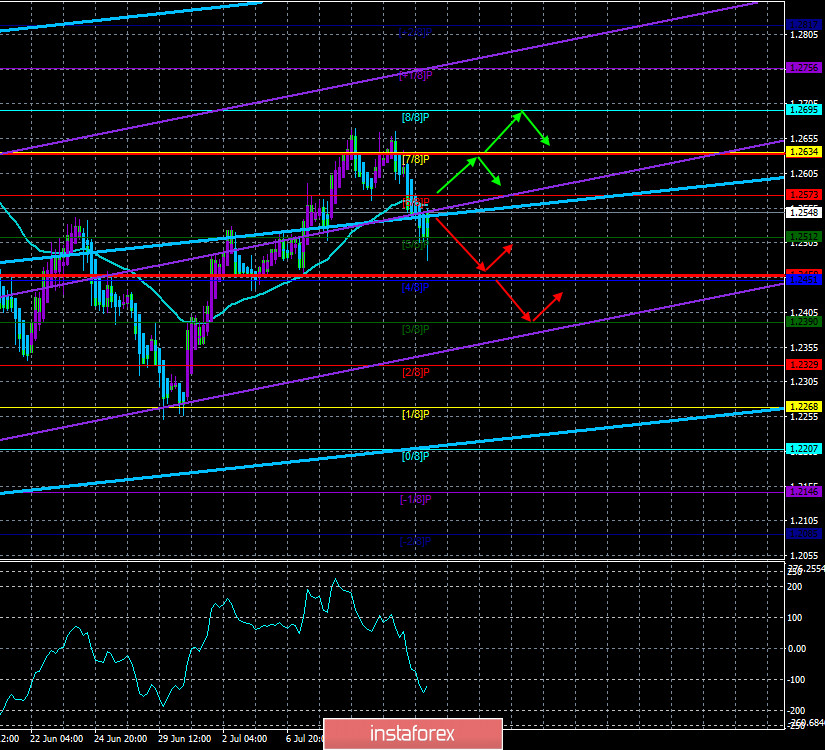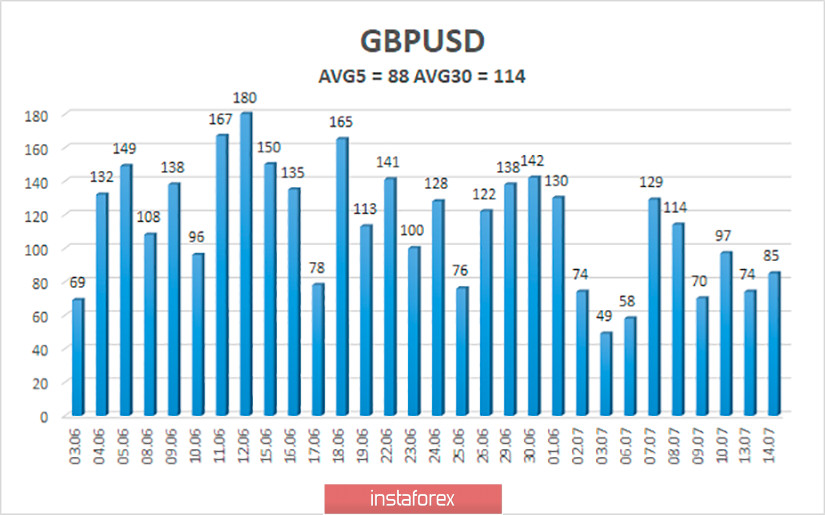4-hour timeframe

Technical details:
Higher linear regression channel: direction - upward.
Lower linear regression channel: direction - upward.
Moving average (20; smoothed) - sideways.
CCI: -121.2859
The British pound, unlike the European currency, was trading lower on Tuesday, July 14. On the one hand, the reason for the uncorrelation of the two main currency pairs could be the macroeconomic statistics from the UK, which turned out to be quite weak. On the other hand, no less weak statistics from the Eurozone were ignored by market participants, so such a conclusion can not be considered unambiguous. It should also be noted that the nature of the movement of both pairs in recent months has been completely different. The euro currency has spent the last month in an absolutely indistinct sideways or weak upward movement. While the pound was trading very actively and did not standstill. At the same time, it is the position of the British pound in the foreign exchange market that now looks weakest due to the uncertainty associated with the future relationship between the European Union and Britain, as well as an extremely strong fall in the British economy as a result of the pandemic and Brexit. However, the British currency regularly shows growth, which we correlate with the epidemiological emergency in the United States, as well as the political and economic crisis in this country. As we wrote earlier, the Fed lowered key rates "almost to zero", so the strength of the monetary policies of these two states equalized. The US dollar no longer has the unquestionable advantage that it previously had.
Macroeconomic statistics from the UK disappointed traders. GDP in May was recorded at +1.8%, although traders expected to see at least +5% after the failed -20.4% a month earlier. Industrial production, as in the European Union, decreased by 20% in annual terms, which was more or less ready for market participants. Such a package of statistics could not cause the British pound to strengthen. Therefore, the GDP report may have created additional pressure on the British pound. Also, negative news continues to come from the fields of Brexit. According to the survey, only a quarter of all UK companies are fully prepared to complete the transition period and switch to the EU trade regime under WTO rules.
Meanwhile, no less negative forecasts are given by representatives of the UK health sector. According to them, in 2020-2021, the country will face the so-called "winter wave" of the epidemic, which will be much worse than the first "wave", which claimed the lives of about 45,000 people, which is the highest figure in all of Europe. A report from the British Academy of Medical Sciences says that people spend much more time indoors in winter, which contributes to the faster and easier spread of infection. Thus, between September and June, about 120,000 Britons may die from COVID. The author of the report, Professor Stephen Holgate, believes that if the necessary measures are taken now, it will be possible to avoid such a scenario. "This is not a prediction, but it is a possibility. The model suggests that there may be more fatalities with a new wave of COVID-19 this winter, but the risk of this can be reduced if immediate action is taken," said Professor Holgate. The Academy of Medical Sciences believes that under the current circumstances, it is necessary to more actively vaccinate the population against influenza, more widely test the population for "coronavirus", constantly remind the population of the importance of observing safety measures, improve the definition of epidemic foci and more effectively localize them.
At the same time, the US recorded a record budget deficit. In June, it amounted to $ 864 billion, which is much higher than the average annual value. The deficit came from the fact that the White House and Congress allocated trillions of dollars to support the economy. But tax revenues during the pandemic were greatly reduced, as at least 25 million workers were laid off, which significantly reduced tax revenues to the Treasury. Meanwhile, the total public debt in the United States has already exceeded $ 26 trillion. The Budget Office forecasts that the budget deficit will be at least $ 3.7 billion in 2020.
Meanwhile, the American president Donald Trump does not allow you to forget about yourself for a day. A few months ago, we reported that YouGov conducted quite an interesting study, which resulted in the figure of 14,000. That's how many times, according to YouGov calculations, Donald Trump was misled in his speeches, comments, and social media posts. A similar study was conducted by the Washington Post, which estimated that the US President has already made more than 20 thousand erroneous or deceptive statements. That is, on average, Donald Trump makes thirteen false statements a day. However, the Washington Post's research is much more in-depth. For example, the publication reports that most often Trump made false statements on the topics of his impeachment, the "coronavirus" pandemic, as well as the racist scandal caused by the death of George Floyd. The publication also reports that most often the President made statements that do not correspond to reality when he spoke about the US economy, that it achieved the best state in the history of the country. Also, Trump lied when he said that he had the largest tax cut in the history of the country. Such statistics again do not paint Trump in the run-up to the presidential election.
In the UK, the consumer price index for June is scheduled to be published on the third trading day of the week. According to experts' forecasts, inflation will slow even more and amounted to 0.4% in June. In monthly terms, the price increase will be 0%. It is possible that in reality, we will see even weaker figures, but the main question now is how market participants look at the topics of the deep economic crisis in the UK, complete uncertainty in the future, and the topic of the epidemiological crisis in the US. Judging by the fact that the quotes of the pound/dollar pair were fixed below the moving average line, the trend changed to a downward one, and traders began to pay more attention to the problems of the Foggy Albion. Thus, in the near future, we still expect a further decline in the pound. However, the reverse fixing of the price above the moving average can bring buyers back into the game. Both linear regression channels are directed upwards.

The average volatility of the GBP/USD pair continues to remain stable and is currently 88 points per day. For the pound/dollar pair, this value is "average". On Wednesday, July 15, thus, we expect movement within the channel, limited by the levels of 1.2458 and 1.2634. Turning the Heiken Ashi indicator upward will indicate a possible resumption of the upward movement.
Nearest support levels:
S1 – 1.2512
S2 – 1.2451
S3 – 1.2390
Nearest resistance levels:
R1 – 1.2573
R2 – 1.2634
R3 – 1.2695
Trading recommendations:
The GBP/USD pair has started a new round of downward correction on the 4-hour timeframe, which may turn into a downward trend. Thus, today it is recommended to open sell orders with the goals of 1.2451 and 1.2390 if the Heiken Ashi indicator does not turn up in the next few hours. It is recommended to resume buying the pair after fixing quotes above the moving average with the first goals of 1.2634 and 1.2695.





















